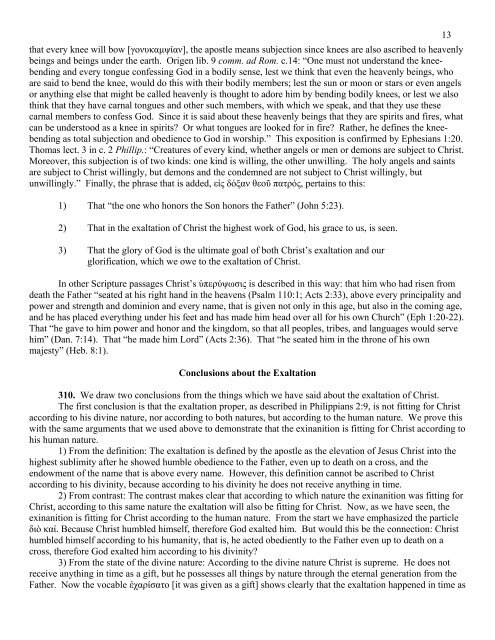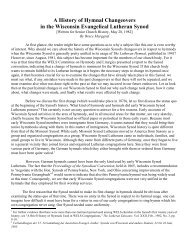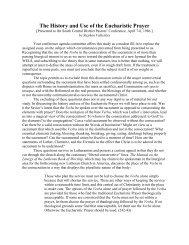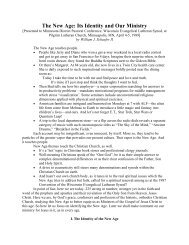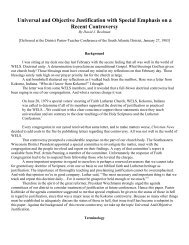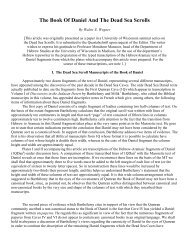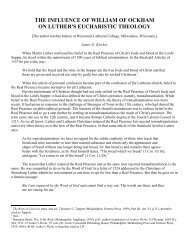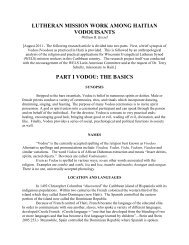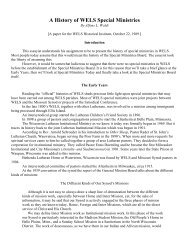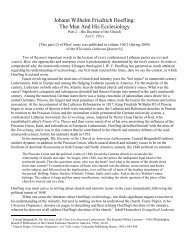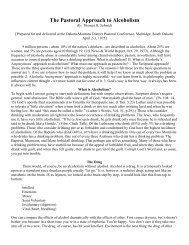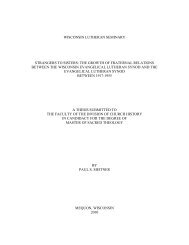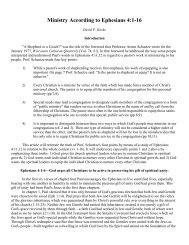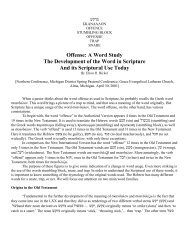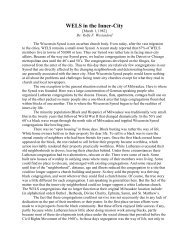Loci Theologici Loci Theologici
Loci Theologici Loci Theologici
Loci Theologici Loci Theologici
You also want an ePaper? Increase the reach of your titles
YUMPU automatically turns print PDFs into web optimized ePapers that Google loves.
13<br />
that every knee will bow [γονυκαμψίαν], the apostle means subjection since knees are also ascribed to heavenly<br />
beings and beings under the earth. Origen lib. 9 comm. ad Rom. c.14: “One must not understand the kneebending<br />
and every tongue confessing God in a bodily sense, lest we think that even the heavenly beings, who<br />
are said to bend the knee, would do this with their bodily members; lest the sun or moon or stars or even angels<br />
or anything else that might be called heavenly is thought to adore him by bending bodily knees, or lest we also<br />
think that they have carnal tongues and other such members, with which we speak, and that they use these<br />
carnal members to confess God. Since it is said about these heavenly beings that they are spirits and fires, what<br />
can be understood as a knee in spirits? Or what tongues are looked for in fire? Rather, he defines the kneebending<br />
as total subjection and obedience to God in worship.” This exposition is confirmed by Ephesians 1:20.<br />
Thomas lect. 3 in c. 2 Phillip.: “Creatures of every kind, whether angels or men or demons are subject to Christ.<br />
Moreover, this subjection is of two kinds: one kind is willing, the other unwilling. The holy angels and saints<br />
are subject to Christ willingly, but demons and the condemned are not subject to Christ willingly, but<br />
unwillingly.” Finally, the phrase that is added, εἰς δόξαν θεοῦ πατρός, pertains to this:<br />
1) That “the one who honors the Son honors the Father” (John 5:23).<br />
2) That in the exaltation of Christ the highest work of God, his grace to us, is seen.<br />
3) That the glory of God is the ultimate goal of both Christ’s exaltation and our<br />
glorification, which we owe to the exaltation of Christ.<br />
In other Scripture passages Christ’s ὑπερύψωσις is described in this way: that him who had risen from<br />
death the Father “seated at his right hand in the heavens (Psalm 110:1; Acts 2:33), above every principality and<br />
power and strength and dominion and every name, that is given not only in this age, but also in the coming age,<br />
and he has placed everything under his feet and has made him head over all for his own Church” (Eph 1:20-22).<br />
That “he gave to him power and honor and the kingdom, so that all peoples, tribes, and languages would serve<br />
him” (Dan. 7:14). That “he made him Lord” (Acts 2:36). That “he seated him in the throne of his own<br />
majesty” (Heb. 8:1).<br />
Conclusions about the Exaltation<br />
310. We draw two conclusions from the things which we have said about the exaltation of Christ.<br />
The first conclusion is that the exaltation proper, as described in Philippians 2:9, is not fitting for Christ<br />
according to his divine nature, nor according to both natures, but according to the human nature. We prove this<br />
with the same arguments that we used above to demonstrate that the exinanition is fitting for Christ according to<br />
his human nature.<br />
1) From the definition: The exaltation is defined by the apostle as the elevation of Jesus Christ into the<br />
highest sublimity after he showed humble obedience to the Father, even up to death on a cross, and the<br />
endowment of the name that is above every name. However, this definition cannot be ascribed to Christ<br />
according to his divinity, because according to his divinity he does not receive anything in time.<br />
2) From contrast: The contrast makes clear that according to which nature the exinanition was fitting for<br />
Christ, according to this same nature the exaltation will also be fitting for Christ. Now, as we have seen, the<br />
exinanition is fitting for Christ according to the human nature. From the start we have emphasized the particle<br />
διὸ καί. Because Christ humbled himself, therefore God exalted him. But would this be the connection: Christ<br />
humbled himself according to his humanity, that is, he acted obediently to the Father even up to death on a<br />
cross, therefore God exalted him according to his divinity?<br />
3) From the state of the divine nature: According to the divine nature Christ is supreme. He does not<br />
receive anything in time as a gift, but he possesses all things by nature through the eternal generation from the<br />
Father. Now the vocable ἐχαρίσατο [it was given as a gift] shows clearly that the exaltation happened in time as


